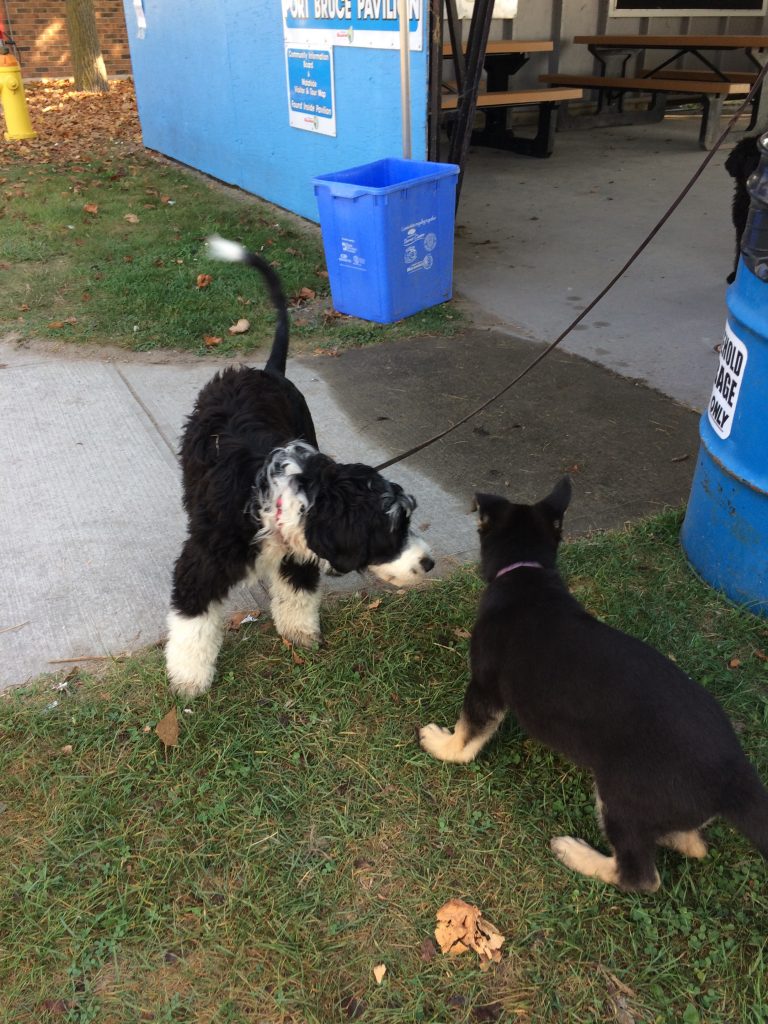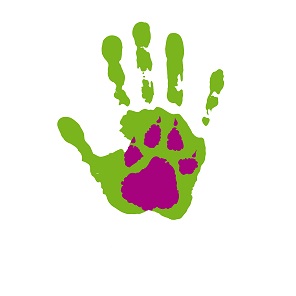Puppy Life Skills 1: Imprinting Behavior

Puppies are not born able to control their emotions. They are not born knowing how to communicate. They have no learning skills, or stress coping skills. In fact, puppies are born ‘clean slates.’ All they know is how to eat, sleep, and fear. These are the skills Mother Nature endows them with so that they can survive.
When a puppy is born their first imprint is from their mother. If she is calm, it will be easier to teach them to be calm. If she teaches them, it will be easier for you to teach them. If she is crazy, barks, or ignores them, then you will have problems with the puppy as it grows.
Look at the puppy’s parents. Ask questions. Your puppy’s will be their parents. Seeing calm parents is not enough. Ask what type of mother the dog was. Did the father help raise the puppy? You are looking for people who will open up and share lots of details and experiences.
If the puppy is introduced to a pack at 5 weeks old then the pack will take over teaching it to be calm and well mannered. Sometimes this can be stressful for breeders, because puppies scream like they are being murdered. But they are not hurt.
Preventing Behavior Problems
Problems start when the puppy breeder does not teach the puppy social tolerance, how to learn, good manners, bite inhibition, follow behaviors, and how to play nicely.
The problems are compounded when a puppy comes to its new home. New owners let puppies run wild, act rude, and bully them. In many cases, new owners mistake this behavior as happy and friendly because the puppy is jumping up, rushing towards other dogs, barking, chasing, and digging.
Ask the breeder what mental stimulation games the puppy has done? Ask if you can give it a try. In fact, you would like a breeder who has done Prodigy Puppy, or Puppy Culture. If not, then ask if they have a journal of their puppy raising program.
The best crossfit workouts for beginners trenbolone enanthate in usa trx and kettlebell circuit workout
This is because many neurological disorders, Obsessive Compulsive behaviors, Fear and Stress Reactive Behaviors, and aggression are caused by isolation and lack of brain stimulation while the brain is growing 2 – 12 weeks. A puppy who has been isolated is the same as a child who is left in a crib until 3 years old with minimal human contact. It will have emotional, mental, and behavioral issues – just like a puppy. You cannot fix these problems, in children, or in puppies.
Bringing Puppy Home
Too Much Too Early – Early Puppy Development Handler Mistakes
Other owners make the mistake of expecting their puppies to be obedience trained without giving them a chance to learn. Showing a puppy how to do something 10x, even if the puppy has done it successfully, is not enough time to learn.
This is not the right time to be teaching your puppy that you are dominant. The problem with teaching dominance is that dogs form ‘families’ not ‘packs’. This means that the leader is calm, confident, and patient. This is unlike wolves where the strongest and most aggressive is the alpha.
The puppy’s mental development is not ready for punishment or dominance. If you start at this time you will make the puppy stressed and/or fearful. They will start developing OCD/repetitive behaviors, nervous behaviors, and lose their trust in you. This is why trainers and behaviorists are seeing reactive behaviors in puppies as young as 12 weeks old.
In this article I’m discussing the theory. In the next article (Puppy Life Skills 2) I will explain how to build a calm, confident dogs.
Puppy Classes and Obedience
Too many trainers ‘do their best’ when training puppies. Unfortunately, they miss vital development stages in a puppy. A puppy under 12 weeks does not need to learn to heel. Instead, it needs to explore its world and learn to trust that you will protect it. In this stage you need to teach your puppy to trust you.
In the first 12 weeks a puppy should be comforted. Protect your puppy. Teach it that all dogs are good. Teach it that all people have treats. Let your puppy say no, ‘I don’t want to meat that _______(dog/person).’ Or ‘I don’t want to investigate that thing.’ After the first 2 weeks of letting your puppy say no you will find out that your puppy will stop, you will comfort it, and then (most) puppies will be ready to ‘give it a try’. This is a critical stage. Make sure that the things your puppy investigates will not frighten him. If your puppy learns to trust you now, it will trust you forever.
What to Teach Young Puppies
This is why I put puppies into behavior and socializing classes before 12 weeks. I leave obedience training until later – instead I teach behaviors:
- Follow me
- Sit and wait
- Do not rush through open doors
- Let me put the leash on
- Go into your crate
- Do not bite
- Do not jump on people
- Leave it, and ‘mine’, and no
- When I stop walking, puppy lays down
- Pee on command in 1 spot, not all over the back yard
I also set up behaviors that teach my puppies to trust me:
- Puppies are pottied every 4 hours
- Puppies are awake for 2 hours, nap for 2 hours
- Every time puppies wake up I take 5 minutes and let them say ‘good morning’ and connect with me.
- I do not punish puppies. If they are bad I hold them still.
- If they are crazy, bit me/bite hard, steal things off the counter, bark and they have been awake and/or very busy for over 1 hour then I put them down for a nap. If they have been awake less than an hour I teach them ‘leave it’, ‘no’, or ‘mine’
- I play with puppies 1:1 for 10 minutes each time they are awake.
- I massage puppies for 2 – 3 minutes and touch them all over.
- Training is continual and fun. Obedience is a lifestyle, not something that happens when a leash is on.
Please continue to Puppy Life Skills 2
